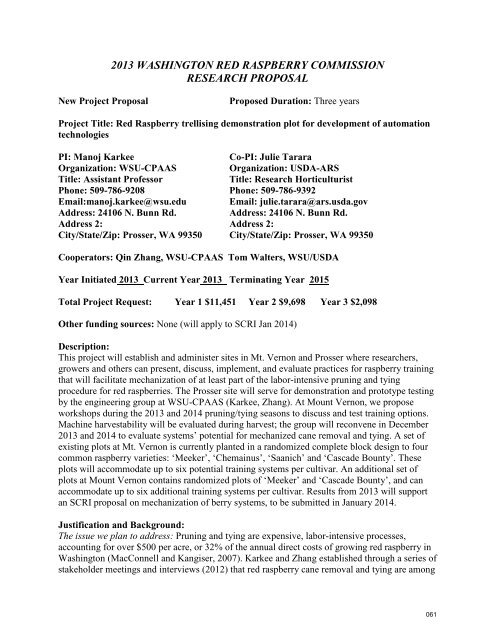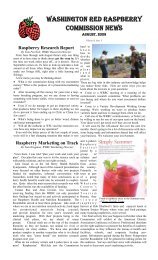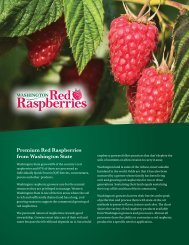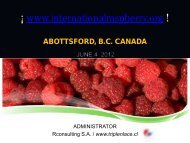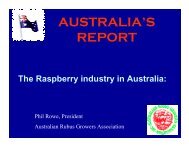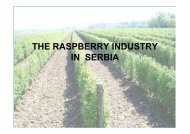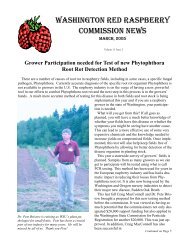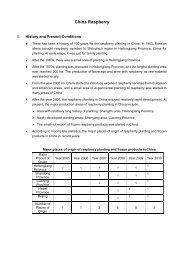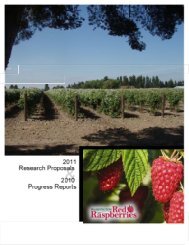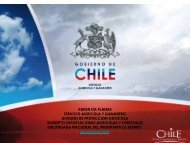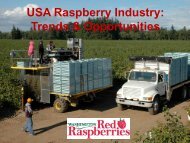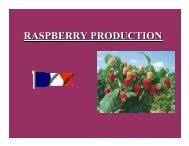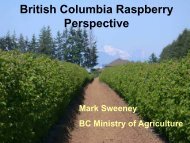2012 - Washington Red Raspberry Commission
2012 - Washington Red Raspberry Commission
2012 - Washington Red Raspberry Commission
Create successful ePaper yourself
Turn your PDF publications into a flip-book with our unique Google optimized e-Paper software.
2013 WASHINGTON RED RASPBERRY COMMISSION<br />
RESEARCH PROPOSAL<br />
New Project Proposal<br />
Proposed Duration: Three years<br />
Project Title: <strong>Red</strong> <strong>Raspberry</strong> trellising demonstration plot for development of automation<br />
technologies<br />
PI: Manoj Karkee<br />
Co-PI: Julie Tarara<br />
Organization: WSU-CPAAS<br />
Organization: USDA-ARS<br />
Title: Assistant Professor<br />
Title: Research Horticulturist<br />
Phone: 509-786-9208 Phone: 509-786-9392<br />
Email:manoj.karkee@wsu.edu Email: julie.tarara@ars.usda.gov<br />
Address: 24106 N. Bunn Rd.<br />
Address: 24106 N. Bunn Rd.<br />
Address 2: Address 2:<br />
City/State/Zip: Prosser, WA 99350 City/State/Zip: Prosser, WA 99350<br />
Cooperators: Qin Zhang, WSU-CPAAS Tom Walters, WSU/USDA<br />
Year Initiated 2013 Current Year 2013 Terminating Year 2015<br />
Total Project Request: Year 1 $11,451 Year 2 $9,698 Year 3 $2,098<br />
Other funding sources: None (will apply to SCRI Jan 2014)<br />
Description:<br />
This project will establish and administer sites in Mt. Vernon and Prosser where researchers,<br />
growers and others can present, discuss, implement, and evaluate practices for raspberry training<br />
that will facilitate mechanization of at least part of the labor-intensive pruning and tying<br />
procedure for red raspberries. The Prosser site will serve for demonstration and prototype testing<br />
by the engineering group at WSU-CPAAS (Karkee, Zhang). At Mount Vernon, we propose<br />
workshops during the 2013 and 2014 pruning/tying seasons to discuss and test training options.<br />
Machine harvestability will be evaluated during harvest; the group will reconvene in December<br />
2013 and 2014 to evaluate systems’ potential for mechanized cane removal and tying. A set of<br />
existing plots at Mt. Vernon is currently planted in a randomized complete block design to four<br />
common raspberry varieties: ‘Meeker’, ‘Chemainus’, ‘Saanich’ and ‘Cascade Bounty’. These<br />
plots will accommodate up to six potential training systems per cultivar. An additional set of<br />
plots at Mount Vernon contains randomized plots of ‘Meeker’ and ‘Cascade Bounty’, and can<br />
accommodate up to six additional training systems per cultivar. Results from 2013 will support<br />
an SCRI proposal on mechanization of berry systems, to be submitted in January 2014.<br />
Justification and Background:<br />
The issue we plan to address: Pruning and tying are expensive, labor-intensive processes,<br />
accounting for over $500 per acre, or 32% of the annual direct costs of growing red raspberry in<br />
<strong>Washington</strong> (MacConnell and Kangiser, 2007). Karkee and Zhang established through a series of<br />
stakeholder meetings and interviews (<strong>2012</strong>) that red raspberry cane removal and tying are among<br />
061


